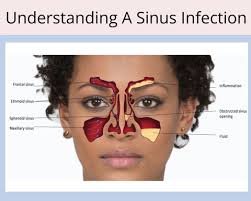
Isa Sinus Infection Contagious? Best Understanding the Risks and Prevention in 2024
isa sinus infection contagious, or sinusitis, are a common health issue affecting millions of people worldwide. They can cause significant discomfort and disrupt daily life with symptoms like headaches, nasal congestion, facial pain, and a runny nose. Given the widespread occurrence of sinus infections, a common question arises: Isa Sinus Infection Contagious? The answer to this question is more nuanced than a simple yes or no. This article delves into the nature of sinus infections, the factors that influence their contagiousness, and tips on preventing the spread of infections.
What Isa Sinus Infection Contagious?
Before exploring whether a sinus infection is contagious, it’s essential to understand what a sinus infection actually is. Sinuses are hollow cavities in the skull located behind the forehead, nose, cheeks, and eyes. These cavities produce mucus, which helps keep the nasal passages moist and traps dust, germs, and other airborne particles.
A sinus infection occurs when the tissue lining the sinuses becomes inflamed or swollen. This inflammation can block the sinuses, trapping mucus and allowing bacteria, viruses, or fungi to grow, leading to infection. Sinus infections can be classified into two main types:
- Acute Sinusitis: This type of sinus infection is usually short-term, lasting up to four weeks. It often results from a viral infection, such as the common cold, but can also be caused by bacteria.
- Chronic Sinusitis: Chronic sinusitis lasts for more than 12 weeks and can be caused by persistent inflammation or bacterial infections. Allergies, nasal polyps, and other medical conditions may also contribute to chronic sinusitis.
Causes of Isa Sinus Infection Contagious
To determine whether a sinus infection is contagious, it’s crucial to identify its underlying causes. Sinus infections can result from various factors, including:
- Viral Infections: The most common cause of sinus infections is viral infections like the common cold. When the virus invades the nasal passages, it can lead to inflammation of the sinus tissues, resulting in sinusitis. Viral infections are generally contagious and can spread through respiratory droplets when an infected person coughs, sneezes, or talks.
- Bacterial Infections: While less common than viral infections, bacteria can also cause sinusitis. Bacterial sinus infections typically develop as a secondary infection following a viral infection. When the sinuses are blocked and unable to drain, bacteria can multiply in the trapped mucus, leading to a bacterial infection. Bacterial sinus infections are not typically contagious, as they do not spread from person to person in the same way that viral infections do.
- Allergies: Allergic reactions can cause inflammation of the nasal passages and sinuses, leading to sinusitis. While the allergy itself is not contagious, the resulting sinusitis can be triggered by exposure to allergens such as pollen, dust mites, or pet dander.
- Fungal Infections: In rare cases, fungi can cause sinus infections, particularly in individuals with weakened immune systems. Fungal sinusitis is not contagious and usually requires specific treatment.
- Environmental Factors: Exposure to pollutants, smoke, and other irritants can also contribute to sinus infections by causing inflammation of the nasal passages and sinuses.
Isa Sinus Infection Contagious?
The answer to whether Isa Sinus Infection Contagious largely depends on the cause of the infection.
- Viral Sinus Infections: If Isa Sinus Infection Contagious is caused by a virus, such as the common cold or influenza, it can be contagious. The virus itself is transmissible, meaning that when an infected person coughs, sneezes, or even talks, they can spread the virus to others. However, it’s important to note that while the virus is contagious, the actual sinus infection (the inflammation and swelling of the sinuses) is not directly spread from person to person. In other words, you can catch the cold virus from someone with a sinus infection, but you may not necessarily develop a sinus infection yourself.
- Bacterial Sinus Infections: Bacterial sinus infections are generally not contagious. They usually occur as a secondary infection following a viral illness. Once bacteria become trapped in the sinuses, they can multiply and cause infection, but this process does not involve spreading the bacteria from person to person.
- Fungal and Allergic Sinus Infections: Neither fungal nor allergic Isa Sinus Infection Contagious. These types of sinusitis are typically triggered by environmental factors, allergens, or individual immune responses, rather than by infectious agents that can be transmitted between people.
How isa sinus infection contagious Spread
Given that viral sinus infections can be contagious, it’s important to understand how they spread. Viruses that cause sinus infections are primarily transmitted through respiratory droplets. When an infected person coughs, sneezes, or talks, these droplets can be inhaled by others nearby, potentially leading to the spread of the virus.
Additionally, viruses can survive on surfaces for a period of time. If an infected person touches their nose or mouth and then touches a surface, such as a doorknob or a phone, the virus can be transferred to that surface. If someone else touches the contaminated surface and then touches their face, they may become infected.
Preventing the Spread of Isa Sinus Infection Contagious
Preventing the spread of Isa Sinus Infection Contagious, particularly those caused by viruses, requires good hygiene practices and some caution. Here are some tips to reduce the risk of spreading or contracting a sinus infection:
- Practice Good Hand Hygiene: Regularly washing your hands with soap and water for at least 20 seconds is one of the most effective ways to prevent the spread of viruses. If soap and water are not available, use hand sanitizer with at least 60% alcohol.
- Cover Your Mouth and Nose: When coughing or sneezing, use a tissue or your elbow to cover your mouth and nose. This helps prevent the spread of respiratory droplets. Dispose of used tissues immediately and wash your hands afterward.
- Avoid Close Contact: If you or someone else has a cold or other respiratory illness, try to avoid close contact, such as hugging, kissing, or sharing utensils, until symptoms improve.
- Disinfect Surfaces: Regularly clean and disinfect commonly touched surfaces, such as doorknobs, light switches, and cell phones, to reduce the risk of virus transmission.
- Stay Home When Sick: If you have symptoms of a cold or sinus infection, it’s best to stay home to avoid spreading the virus to others. Resting and taking care of yourself can also help you recover more quickly.
- Use a Humidifier: Keeping the air in your home moist with a humidifier can help prevent sinus infections by keeping your nasal passages from becoming too dry.
- Manage Allergies: If you have allergies, take steps to manage them effectively. This may include using antihistamines, avoiding known allergens, and using air purifiers in your home.
- Stay Hydrated: Drinking plenty of fluids can help thin mucus and promote drainage, reducing the risk of a sinus infection.
- Avoid Smoking and Exposure to Pollutants: Smoke and pollutants can irritate the nasal passages and sinuses, increasing the risk of infection. Avoid smoking and try to limit exposure to secondhand smoke and environmental pollutants.
Conclusion
Isa Sinus Infection Contagious, while uncomfortable and sometimes painful, are generally not contagious, except when they are caused by a viral infection. Understanding the underlying cause of a sinus infection is key to determining whether it poses a risk of spreading to others. By practicing good hygiene, staying informed about the nature of Isa Sinus Infection Contagious, and taking preventive measures, you can reduce the likelihood of spreading or contracting a sinus infection. If you experience persistent or severe symptoms, it’s always a good idea to consult a healthcare professional for proper diagnosis and treatment.


